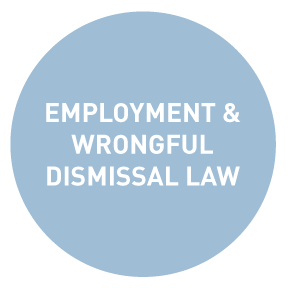AREAS OF PRACTICE
EMPLOYMENT & WRONGFUL DISMISSAL LAW
Smith Hutchison advises both employers and employees on how to meet the changing job market to structure termination packages, lay offs and severance. If settlements cannot be reached, we will work to protect our clients' rights in Court and before administrative Boards and Tribunals that deal with employment issues. Termination of employment means that the employment relationship is over. This can occur by the expiration of an employment term or upon the firing of an employee. When an employer lays-off or fires an employee, the employer must either have just cause for doing so or provide the employee with appropriate notice period or pay in lieu of such notice. Under the B.C. Employment Standards Act, an employer need not provide notice or pay in lieu if an employee is fired for just cause. If there is no just cause, the employer may be subject to a wrongful dismissal action. Many things can constitute cause, but it is up to the employer to prove that cause existed. because dismissal without notice is a severe punishment, it is justified only where there has been serious misconduct. Generally an employer must give an employee a warning if the misconduct is not sufficiently serious to justify dismissal. Below are some categories traditionally constituting just cause:
1. fraudulent misrepresentations as to qualifications;
2. serious misconduct;
3. sexual harassment;
4. breach of fidelity or duty;
5. conflict of interest;
6. wilful disobedience.
Upon termination in British Columbia, the minimum standards for compensation are in the Employment Standards Act. These range from 1 week's pay after 3 months of service up to 8 weeks' pay after 8 years. However, an employee can be entitled to much more compensation under the common law - up to 24 months in the most severe cases. If you have been wrongfully dismissed, you must look for similar employment and document this search even though it may reduce the court's award of compensation. This is because the law requires you to minimize your losses by looking for a similar job or your award may be reduced anyway. There are also situations where an employee leaves employment of his own volition which also entitle the employee to claim damages. This is known as constructive dismissal and it arises where the employer has changed the employment contract or acted in such a way as to entitle the employee to treat the actions of the employer as constituting dismissal.


